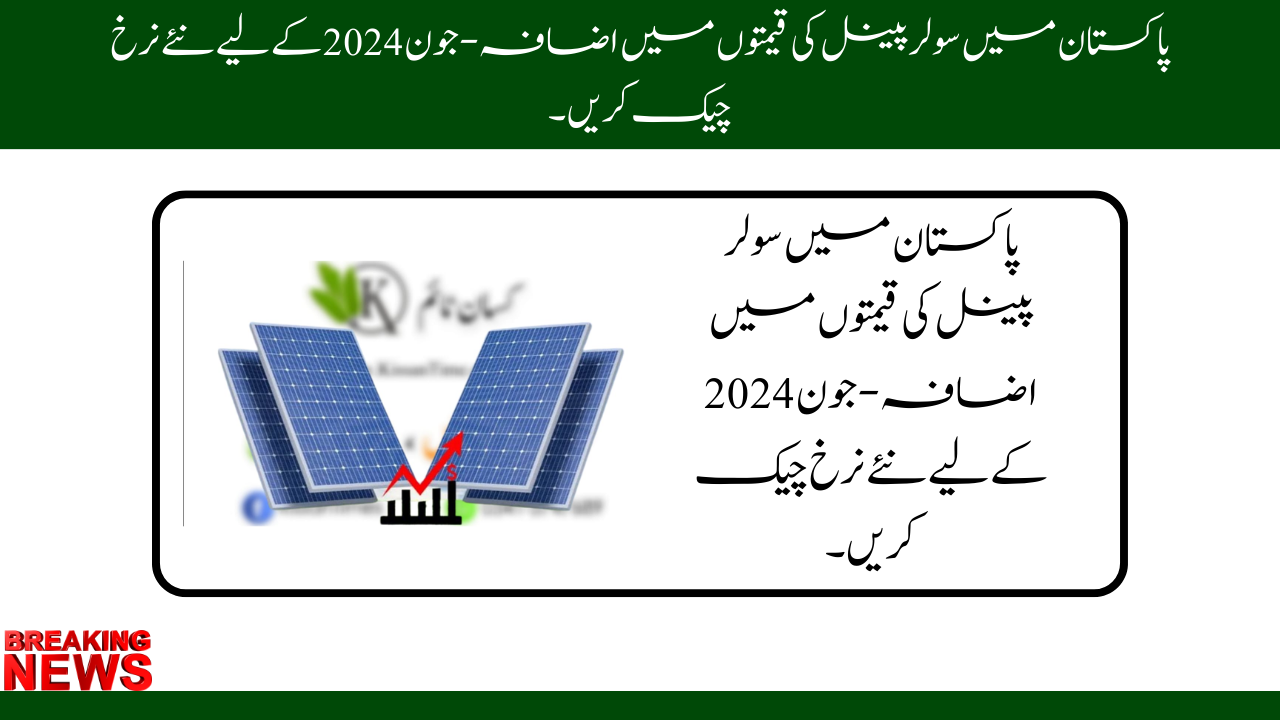Pakistan’s burgeoning solar energy sector has hit a snag. In the lead-up to the federal budget announcement on June 12th, 2024, solar panel prices have witnessed a significant increase, raising concerns for consumers and the industry’s future. This price hike, attributed to speculation about new taxes on solar panels, throws a temporary shadow on the nation’s shift towards clean energy.
The Price Jump: A Ripple Effect
Reports suggest a blanket increase of Rs. 8 per watt across various panel sizes and specifications. This translates to a notable rise, particularly for larger panels. The previously affordable 588-watt panel, costing around Rs. 3,000, now carries a price tag ranging between Rs. 4,000-5,000. Smaller panels, typically in the 180-280 watt range, have also seen a price jump of Rs. 1,000 to Rs. 1,500.
This price increase is a direct consequence of market jitters surrounding potential tax hikes on solar panels in the upcoming budget. Traders, anticipating these changes, have proactively adjusted their prices. The final decision on the taxes will be revealed on June 12th, but the uncertainty has already impacted consumer sentiment.
also read KP Govt Interest-Free Loan Scheme
Beyond Taxes: Concerns About Net Metering
Adding to the worries are reports suggesting the government might consider replacing the existing net metering system with a gross metering system. Under net metering, any excess solar energy produced by a home or business is fed back into the grid, with the consumer receiving credits that offset their electricity bills. A gross metering system, however, doesn’t offer such benefits, potentially discouraging investment in solar power.
also read Benazir Kafalat New Payment and New RegistrationSchema
The Potential Impact: A Double Whammy
The combined effect of a price increase and potential policy changes regarding net metering could be detrimental to Pakistan’s solar energy sector. Here’s a closer look at the possible consequences:
- Slower Adoption: Higher upfront costs due to increased panel prices could deter potential consumers from going solar. This could slow down the overall growth of the sector, hindering Pakistan’s clean energy goals.
- Discouragement for Existing Users: Existing solar users who benefit from net metering might be discouraged by a shift to a gross metering system. This could lead to a decline in investment in system expansion and maintenance.
- Impact on Installers and Businesses: A slowdown in the solar market can negatively impact installers and businesses associated with the sector. This could lead to job losses and a decline in the overall economic contribution of the solar industry.

A Call for Clarity and Long-Term Vision
The recent price surge and potential policy changes highlight the need for clear communication from the government. Transparent explanations regarding tax implications and net metering policy are crucial for consumer confidence and industry stability.
Furthermore, a long-term vision for Pakistan’s solar energy sector is essential. Policies should encourage investment and innovation, ensuring a sustainable and cost-effective path towards clean energy adoption.
also read BISP Registration Through NSER FormSchema
Looking Ahead: A Balancing Act
The upcoming budget offers an opportunity to address these concerns. The government needs to strike a balance between generating revenue and fostering the growth of the solar power sector. Here are some potential solutions:
- Targeted Taxes: If new taxes are implemented, they should be carefully designed to target specific aspects of the industry without significantly impacting end-user costs.
- Continued Support for Net Metering: Maintaining a robust net metering system remains vital to incentivize solar adoption and ensure a fair return on investment for consumers.
- Focus on Sustainability: Policy decisions should prioritize long-term sustainability by promoting research and development in solar technology and encouraging local manufacturing of solar panels.
Yes, there has been a significant increase in solar panel prices in Pakistan in June 2024, just ahead of the federal budget presentation scheduled for June 12th. This rise is attributed to traders anticipating new taxes on solar panels in the upcoming budget.
Here’s a breakdown of the new solar panel prices as of June 10th, 2024:
- Price increase: Rs. 8 per watt across various panel sizes and specifications.
- 588-watt panel: Previously costing around Rs. 3,000, it now ranges between Rs. 4,000-5,000.
- Smaller panels (180-280 watts): Prices have jumped between Rs. 1,000 and Rs. 1,500.
It’s important to note that these are just general ranges, and the exact price may vary depending on the brand, quality, and vendor you choose.
Here are some additional details to consider:
- This price hike is due to speculation about new taxes, and the final decision on these taxes will be revealed in the budget on June 12th.
- Some reports suggest the government might be considering replacing the net metering system with a gross metering system, which could further discourage solar power adoption.
Conclusion
While the current price hike presents challenges, it is important to remember the long-term benefits of solar energy. With clear communication, supportive policies, and a focus on long-term sustainability, Pakistan can navigate these temporary hurdles and ensure a brighter future powered by clean energy. Consumers, businesses, and the environment all stand to gain from a thriving solar energy sector in Pakistan.
